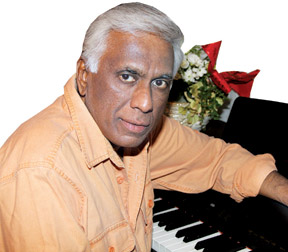Best yet to come, BHADRAJI?
Sachitra Mahendra
 With a 40-year writing career under his belt, Bhadraji Mahinda
Jayatilaka believes time is now ripe to act for his next generation. It
was quite difficult to get our works published back then, adds
Jayatilaka, but writers had a good audience all the same. And now, with
many more young novelists entering the book industry, it is not certain
if they receive the right kind of recognition. With a 40-year writing career under his belt, Bhadraji Mahinda
Jayatilaka believes time is now ripe to act for his next generation. It
was quite difficult to get our works published back then, adds
Jayatilaka, but writers had a good audience all the same. And now, with
many more young novelists entering the book industry, it is not certain
if they receive the right kind of recognition.
How far would they have to strive for this recognition, which they
deserve very much so?
With a literary month called September around the corner, Jayatilaka
will add one more award to recognize young talent. The award, he
explains, will encourage the up and coming novelists every year.
Q: Young novelists are gradually dominating the book market with
their books published by established publishing firms. Things had been
different years, or decades, ago, when finding a publisher was a tough
job. For instance your first novel came out as an author publication,
back in 1970s. How do you analyze the evolution?
|

Bhadraji Mahinda Jayatilaka |
A: Back in the 1970s there were only a few publishing houses. They
were selective. They rarely gave a break to a new, unknown, writer,
since publishing such work was a risk. Also there was a limited
availability of printing paper at times. This shortage limited the
publications. Those days, more time was needed even for typesetting.
So, I had to publish my own book with my own funds after doing the
rounds of known publishers. But my book became a success since it had an
unusual theme about a beggar boy born on the same day that the
Bodhisattva, Prince Siddhartha Gautama was born in Kimbulwatpura.
Titled 'Sudhu Hansayo Igila Giyaha' (The White Swans Flew Away), this
book has gone into a fourth print. I plan to do a fifth print with a
better presentation, with new illustrations.
But now, things have changed. Technology has progressed. There are
more publishing houses looking for saleable books.
Q: Do you view this as a positive trend?
A: I feel this is overdone with a glut in the market, which, I
think, will even out according to the law of supply and demand.
A few writers still do self publications with moderate success. Even
smaller publishers have a tough time in getting their books to the
readers with the limited available space on bookshelves in the few
leading book sellers' and publishers' shops. Getting published does not
mean that they all sell well. Publishing like any other business is a
gamble.
Q: You have quite a large number of publications under your
belt. They are either translations, adaptations, originals or some
research work. How do you strike a balance between researching and
writing?
A: I have written 110 books. Leading as well as upcoming
publishers have published them.
Any work of creative writing takes time to research. Even then, the
inspiration comes instantly like a spark. Once I get the idea, some
stories flow out easily. All characters and situations, sometimes, take
over the story to get my point across.
More time is needed for historical novels, spiritual novels or
philosophical novels. As the research is done, I visualize the places
and people and the order of things gel in my head. Then it is a matter
of putting it down on paper. I write fast. So once the research is done,
the rest is easy. The story flows out of me effortlessly.
Q: Most of your novels, including the first, are based on
Buddhist themes. What is the source of inspiration?
A: I have some Buddhist themed novels plus a novel about
Jesus' life. Titled 'Gethsemeni Sandyawa' (Evening in Gethsemeni), it
not only tells Jesus' story, but explains the history and politics of
the time.
It also paints a picture of the places. This is the first and only
novel in Sinhalese about Jesus. Just like this, when I write a Buddhist
themed novel, I travel to the relevant places in mind and visualize the
people in action.
My stories become very authentic and true to life that way. 'Dineka
Kusinarawe' (A Day in Kusinara), which was published on the same day
along with Gethsemeni Evening, deals with the last days of the Buddha. I
used the Maha Parinibbana Sutta as the base for this.
Another novel titled 'Visala' was inspired by the Ratana Sutta. Both
won the Best Buddhist Novel Award given by the All Ceylon Buddhist
Congress.
As a child I read the Dhammapada, the Jataka tales and other
spiritual books. These inspired me in my writing. When writing any book,
I am in that place, in that time frame, witneswsing the happenings as if
on a screen before me.
Q: How does the reader respond to your creativity?
A: The readers respond very well to my books. I have different
followings for different genre. I write on a variety of subjects. Some
readers avidly follow my horror and mystery stories urging me to write
more. A couple of my children's books are popular with the kids. Others
follow my Buddhist novels and other spiritual writing. I also write on
social issues and about ten of my novels had been serialized in leading
newspapers over the years so my name is familiar to the newspaper
readers as well.
The late Most Ven Balangoda Ananda Maitreya Thera personally told me
that the two best books he ever read were my 'Pavuru Bandhi Raajyaya'
(for which I won the D R Wijewardena Award) and 'Dona Luisa Saadahneege
Kathawen Kotasaki' (our family saga which was also shortlisted for D R
Wijewardena Memorial Award). For some publishers, I am a bestselling
author and I do get fan mail by regular air mail as well as emails.
Q: You plan to launch 'award for the best maiden novel' with
your own funds. Sri Lanka already has a considerable number of awards.
Where do you place yours among these awards?
A: I do not think we have a large number of awards in Sri
Lanka. There are five main awards for the Sinhala author: Godage,
Vidyodaya, All Ceylon Buddhist Congress, State Literary Awards and
Swarna Pusthaka. D R Wijewardena Memorial Award used to be popular, but
does not exist any more. So there are only a limited number of awards.
Even then, the newcomers find it hard to compete. My aim is to establish
an award to two new authors every year. These will be maiden novels,
already published. A panel of judges will help me in the task. Since I
have been living in the USA for the last 40 years, this award will
commemorate my 40th year in writing from overseas.
Q: Literary contribution of writers settled in foreign
countries is usually looked down: they don't portray the real Sri Lankan
culture. You have been outside Sri Lanka for a long time. Do you agree?
A: Who says so? I do not think that there are too many of us
writing from abroad. I have won several major awards for my writings in
Sri Lanka, so I do not feel left out. I do my best to contribute. Though
I have been out of the country for over 40 years, I keep in touch by
visiting my motherland every year. So I see what is happening in Sri
Lanka and I am in touch with people in Sri Lanka via all electronic
media: telephone, email and skype. I also see the changes that take
place every year when I visit. I see these changes more than the ones
who live in Sri Lanka since they do not see the gradual change. So, I
feel that I can portray Sri Lanka quite accurately as it is.
Q: Voluminous novels, running for over 600 pages, are becoming
a trend. You have authored such novels too. Do you think they have a
good readership in today's busy modern lifestyle?
A: Some people like to read big books while others prefer to
read smaller books. I have heard from both groups. I do not think
reading voluminous novels is a trend. Some of my big novels are
currently being published with a smaller font to cut down on paper cost.
You are right about busy life styles and available reading time. But
those who are hooked on reading will always find time to read. The size
of the book does not make a classic. For example Ernest Hemingway's Old
Man and the Sea was a small book that made a great impact. J D
Salinger's 'Catcher in the Rye' is another example. There are many other
books like that. Though short stories do not take much time to read, I
feel that short stories, like poetry, are a dying art. Many publishers
are reluctant to publish poetry and short stories.
Q: You are a multi-rounder: lyricist, creative writer, singer,
painter and so on. Which role interprets you best?
A: I do write music and lyrics and sing on stage. I have my
own drawing techniques which I teach through college courses. I also
paint in all media (watercolour, acrylic, oil, pastel pen and ink). I
write dramas for stage, television and screen and act and direct. I also
design stage sets for many major Sri Lankan events and shows in the USA.
I have written stage plays in English and Sinhala and have played the
lead roles in some of them here in the USA. I love to direct and act for
television movies and stage. But mostly I like to stay home and write
and write and write, because it gives me wings to go to many wonderful
places in my mind. |





